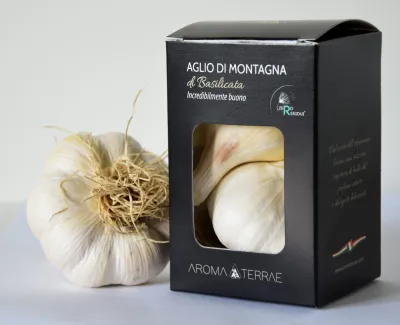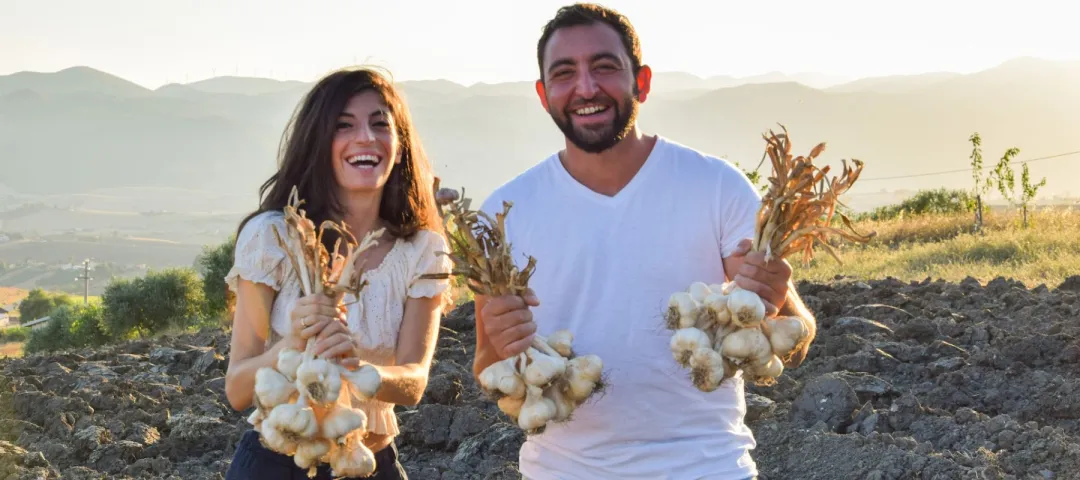General information
RDP Priority
- P2. Competitiveness
RDP Focus Area
- 2A: Farm’s performance, restructuring & modernisation
RDP Measure
- M04: Investments in physical assets
Beneficiary type
- Farmer / land manager
Summary
This project involved using CAP funds to help a family farm cover the costs of investing in new low-impact production equipment for regenerative agroecology as well as new storage facilities for their garlic crops in Italy's mountains. Such storage facilities allow producers to extend the shelf life of their garlic, limiting losses from spoilage and ensuring a steady supply throughout the year.
The beneficiary is Aroma Terrae, an Italian family farm business producing garlic with the 'Zero Pesticides' certification. It is run by Angelica and Francesco Santoro and has been producing and selling white garlic, handling everything from the field to the consumer.
Today, Aroma Terrae's garlic stands out thanks to strengths that include their completely plastic-free packaging and the artisanal, hand-selected quality control, which ensures high standards.
Due to the project, garlic is now stored, sorted, and packaged in their warehouse, which is powered entirely by solar energy.
Results
- Improved productivity capacity and competitiveness with new storage facilities.
- Supporting six jobs (five for women).
- Reduced use of fossil fuels, thanks to the solar panel system and CO2 sequestration through cover crops.
- Less pesticide use, thanks to a production method focused on soil health, which leads to strong, healthy plants that can resist pests.
- Plastic eliminated by using FSC-certified origin paper for packaging.
- Rainwater collection basins help save water during periods of drought.
- Market advantage and brand positioning, including by demonstrating sustainability and the label 'Mountain Garlic from Basilicata'.

Promoter
Aroma Terrae
Funding
Total budget 321 922 (EUR)
EAFRD: 73 763 (EUR)
National/Regional: 48 159 (EUR)
Private/own: 200 000 (EUR)
Keywords
Ressourcen
Documents
Context
Storage facilities play important roles in the agricultural practices of Italian garlic farmers, particularly in mountainous regions. These farmers often face challenges related to climate variability and limited access to markets. By using storage facilities, producers can extend the shelf life of their garlic, limiting losses from spoilage and ensuring a steady supply throughout the year.
By reducing waste and promoting efficient resource management, storage also enables farmers to capitalise on price fluctuations by allowing them to sell their produce during periods of higher demand. This strategic timing can significantly enhance their profit margins. Additionally, well-maintained storage conditions help preserve the quality of garlic, which is essential for maintaining consumer satisfaction and market reputation.
Mountain food branding schemes help enhance product visibility and marketability, fostering consumer loyalty, and enabling small farmers to command premium prices and sustain their livelihoods while preserving traditional agricultural practices.
Angelica Santoro and her husband Francesco are Italian mountain garlic farmers. They began experimenting, collecting data, and observing which garlic varieties worked best in their area, with production based on cover crops, green manure, preference for mechanical over chemical interventions, and manual weed removal. Their company, called Aroma Terrae, blends the family farm's marketing and agricultural skills. They make use of storytelling to promote the healthy, safe, and sustainable aspects of their products to create a connection and boost customer engagement, often turning buyers into real fans.
Access to enough land, equipment, and storage were issues for the company before this CAP-funded project began.
Objectives
A development plan for the farm aimed to:
- establish adequate production and storage capacity for moving closer to direct sales by B2C (business-to-consumer), and gradually reduce the portion of revenue generated from B2B (business-to-business).
- keep experimenting to achieve fully organic garlic production.
- adopt more regenerative farming practices to preserve soil fertility and allow for long-term garlic cultivation.
- build rainwater collection basins, using the natural slopes of the hilly production area, to combat drought.
- bring visitors to the farm to share the company philosophy, promote healthy eating, and respect for biodiversity.
Activities
Costs co-funded by the CAP were:
- purchasing basic mechanical equipment: tractor, garlic seeder and harvester, soil tilling tools.
- building a warehouse with a refrigerated storage unit.
Related project actions involved:
- creating the brand.
- joining the optional quality label ‘Mountain Product’.
- designing graphic lines, brand image, and packaging.
- launching social media channels.
- distributing product samples to buyers and wholesalers.
- installing a photovoltaic system.
- buying a product sorting and cleaning line.
- hiring staff for sorting and packaging.
- obtaining the ‘Zero Pesticides’ certification.
Main results
- Improved productivity capacity and competitiveness with new storage facilities.
- Supporting six jobs (five for women).
- Reduced use of fossil fuels, thanks to the solar panel system.
- Less pesticide use, thanks to a production method focused on soil health, which leads to strong, healthy plants that can resist pests.
- Plastic eliminated by using FSC-certified origin paper for packaging.
- CO2 sequestration through cover crops and adding carbon to the soil by plowing them under, combating soil erosion and compaction and the control of weeds given by the practice of cover crops.
- Rainwater collection basins help save water, since the clay soil and typical rainfall at that altitude allow the farm to grow without extra irrigation even during periods of drought.
- Market advantage and brand positioning, including by demonstrating sustainability.
- Promoting the Basilicata region's interior and remote areas with the label ‘Mountain Garlic from Basilicata’.
Key lessons
By embracing pesticide-free production methods, Italian mountain garlic farmers can effectively capitalise on emerging market trends while contributing positively to environmental stewardship.
Storage facilities are indispensable for enhancing the economic viability and resilience of garlic farming in Italy's mountainous terrains. Storage supports sustainable farming practices and allows agri-food businesses to better plan their production schedules, allowing labour to be allocated more effectively when they have reliable storage options available.
Mountain branding helps cultivate a sense of community among farmers, encourages collaboration and knowledge sharing, improves collective bargaining power against larger competitors, and attracts tourism, providing additional revenue streams for small garlic farms through farm-to-table experiences and local markets. This can convert the challenge of mountain horticulture into a selling point.
"Our slogan says: 'elegant flavours': for us, elegance means a sense of harmony- harmony with nature, with the people who work with us, and the harmony of flavours in a dish."
Angelica Santoro

